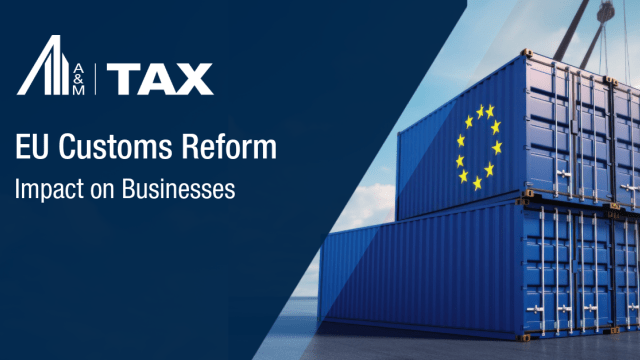German Tax Update – 3 July 2025
1. Germany Broadens Evidence Requirements for VAT Exemptions on Exports
What happened?
On July 1, 2025, the German Ministry of Finance has amended the VAT Application Decree (UStAE) to implement the CJEU’s abuse-of-law rulings (Cartrans, Vinš, Unitel) and provide clearer guidance on when export supplies can still benefit from VAT exemption in the absence of formal customs confirmation. According to the new guidance, the exemption is to be granted where the material conditions for an export can be demonstrated using objective criteria, even if formal documentary requirements are not fully met. This includes scenarios where customs stamps are unavailable – for instance, in airport retail, deliveries to diplomatic missions, or military exports. The revised decree now lists acceptable forms of alternative proof, such as certificates from German public bodies (including the Ministry of Foreign Affairs and the Bundeswehr), verified customs clearance documents from non-EU countries, or military transport records. While documentation in foreign languages must generally be accompanied by a certified translation, import documents in English may be accepted without translation on a case-by-case basis.
Who is affected?
Exporters, airport retailers, defense contractors, and suppliers to diplomatic missions.
What should companies do?
- Review and, if needed, adapt your export documentation procedures to reflect the new accepted forms of evidence.
- Pay special attention to exports via airports and to armed forces or diplomatic missions.
- Transitional relief applies to supplies made before January 1, 2026, if existing documentation is conclusive.
A&M Tax Contact: Matthias Luther
Source: BMF Letter dated 1 July 2025 https://www.bundesfinanzministerium.de/Content/DE/Downloads/BMF_Schreiben/Steuerarten/Umsatzsteuer/Umsatzsteuer-Anwendungserlass/2025-07-01-steuerbefreiung-missbrauchsrechtspre.pdf
—
2. CJEU Rejects Blanket Market Value Rules for Intra-Group Services
On July 4, 2025, the CJEU clarified in its Högkullen ruling (C808/23) that services provided by a parent company to its subsidiaries – such as finance, HR, IT, and general management – must not automatically be treated as a single indivisible supply that cannot be benchmarked against market transactions. The Court held that each service component must be assessed on its own merits, to determine whether comparable market services exist. Only if such comparables are entirely lacking, tax authorities may revert to the fallback method under Article 72(2) of the VAT Directive, which refers to the full cost of providing the services. The ruling also emphasizes that intra-group pricing arrangements (such as cost-plus allocations) must not be used to circumvent proper VAT valuation principles. Otherwise, the risk of revaluation by the authorities increases – particularly where the recipient does not have full input VAT recovery rights.
Who is affected?
Multinational groups providing centralized services to subsidiaries.
What should companies do?
- Ensure internal service pricing models (e.g., cost-plus) are supported by proper benchmarking and segmentation.
- Reassess deduction of input VAT where recipients have limited or no VAT recovery rights.
- Avoid blanket classifications of intra-group services as “non-comparable” to reduce risk of reassessment.
A&M Tax Contact: Matthias Luther
Source: ECJ judgment of 4 July 2025 (C-808/23)
https://curia.europa.eu/juris/liste.jsf?language=de&td=ALL&num=C-808/23
__
3. BFH Confirms German Tax Exemption for Dutch Employment Income Despite Application of “30%-Ruling”
What happened?
In its ruling of April 10, 2025 (published 03 July 2025, Case VI R 29/22), the German Federal Fiscal Court (BFH) confirmed that Germany must exempt employment income relating to services performed in the Netherlands from German taxation even if the income was not effectively taxed in the Netherlands, based on its “30%-Ruling” (a tax concession for inbound employees). The court ruled that even income that is tax exempted in the Netherlands based on the “30%-Ruling” is still deemed to be fully taxed there, which is a prerequisite for the granting of a double taxation treaty exemption in Germany.
The decision unexpectedly overturned the lower court’s preliminary ruling in favour of the taxpayer and represents a very welcome clarification of a long-standing uncertainty in cross-border cases where employees reside in Germany but work in the Netherlands under the favorable tax conditions of the Dutch “30%-Ruling”.
Who is affected?
- German tax residents with Dutch employment income who benefit from the “30%-Ruling” in the Netherlands.
- German Employers assigning staff to the Netherlands.
- HR and mobility teams managing expats in the Netherlands.
What should companies and individuals do?
- Review ongoing German income tax and payroll tax filings for employees with Dutch income.
- Consider applying for tax refunds if employment income was previously taxed in Germany by the authorities due to lack of effective taxation in Netherlands.
- Reassess assignment policies and shadow payroll procedures to reflect this welcome clarification.
However, it remains to be seen if the German tax authorities will accept the ruling as generally applicable by publishing it in the Federal Tax Gazette. If the tax authorities explicitly do not want to apply the ruling beyond the individual case decided, they generally have the option of regulating this by means of a so-called “non-application decree”.
A&M Tax Contact: Christian Roepke
Source: BFH ruling VI R 29/22, judgment of 10 April 2025 (published 03 July 2025) https://www.bundesfinanzhof.de/de/entscheidung/entscheidungen-online/detail/STRE202520182/






